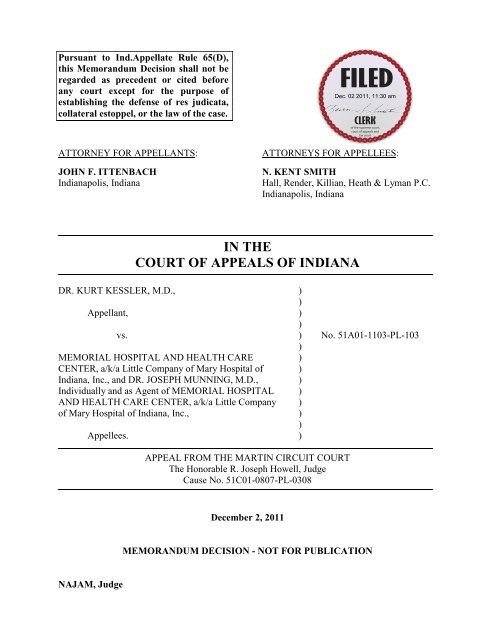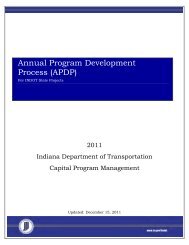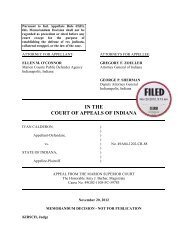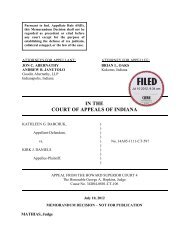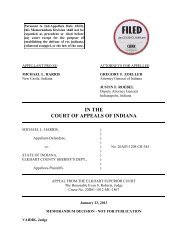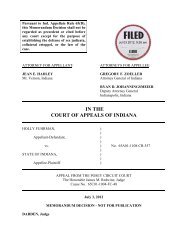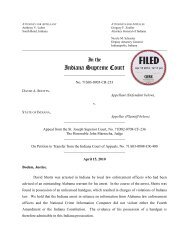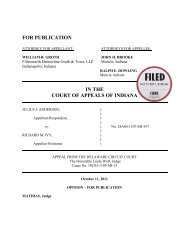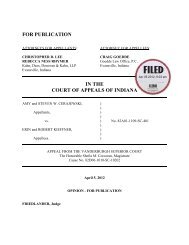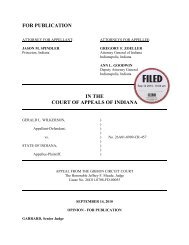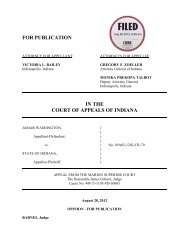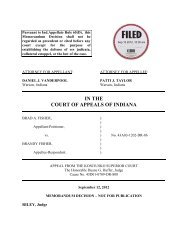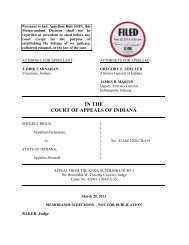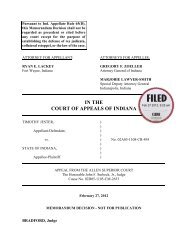Dr. Kurt Kessler, M.D. v. Memorial Hospital and ... - State of Indiana
Dr. Kurt Kessler, M.D. v. Memorial Hospital and ... - State of Indiana
Dr. Kurt Kessler, M.D. v. Memorial Hospital and ... - State of Indiana
You also want an ePaper? Increase the reach of your titles
YUMPU automatically turns print PDFs into web optimized ePapers that Google loves.
Pursuant to Ind.Appellate Rule 65(D),<br />
this Memor<strong>and</strong>um Decision shall not be<br />
regarded as precedent or cited before<br />
any court except for the purpose <strong>of</strong><br />
establishing the defense <strong>of</strong> res judicata,<br />
collateral estoppel, or the law <strong>of</strong> the case.<br />
ATTORNEY FOR APPELLANTS:<br />
JOHN F. ITTENBACH<br />
<strong>Indiana</strong>polis, <strong>Indiana</strong><br />
ATTORNEYS FOR APPELLEES:<br />
N. KENT SMITH<br />
Hall, Render, Killian, Heath & Lyman P.C.<br />
<strong>Indiana</strong>polis, <strong>Indiana</strong><br />
IN THE<br />
COURT OF APPEALS OF INDIANA<br />
DR. KURT KESSLER, M.D., )<br />
)<br />
Appellant, )<br />
)<br />
vs. ) No. 51A01-1103-PL-103<br />
)<br />
MEMORIAL HOSPITAL AND HEALTH CARE )<br />
CENTER, a/k/a Little Company <strong>of</strong> Mary <strong>Hospital</strong> <strong>of</strong> )<br />
<strong>Indiana</strong>, Inc., <strong>and</strong> DR. JOSEPH MUNNING, M.D., )<br />
Individually <strong>and</strong> as Agent <strong>of</strong> MEMORIAL HOSPITAL )<br />
AND HEALTH CARE CENTER, a/k/a Little Company )<br />
<strong>of</strong> Mary <strong>Hospital</strong> <strong>of</strong> <strong>Indiana</strong>, Inc., )<br />
)<br />
Appellees. )<br />
APPEAL FROM THE MARTIN CIRCUIT COURT<br />
The Honorable R. Joseph Howell, Judge<br />
Cause No. 51C01-0807-PL-0308<br />
December 2, 2011<br />
MEMORANDUM DECISION - NOT FOR PUBLICATION<br />
NAJAM, Judge
STATEMENT OF THE CASE<br />
<strong>Dr</strong>. <strong>Kurt</strong> <strong>Kessler</strong>, M.D., appeals the trial court’s grant <strong>of</strong> summary judgment in<br />
favor <strong>of</strong> <strong>Memorial</strong> <strong>Hospital</strong> <strong>and</strong> Health Care Center (“<strong>Memorial</strong>”) <strong>and</strong> <strong>Dr</strong>. Joseph<br />
Munning, M.D., on <strong>Dr</strong>. <strong>Kessler</strong>’s complaint alleging fraud. <strong>Dr</strong>. <strong>Kessler</strong> raises a single<br />
dispositive issue on appeal, namely, whether the trial court erred when it concluded that<br />
there are no genuine issues <strong>of</strong> fact precluding summary judgment.<br />
We affirm.<br />
FACTS AND PROCEDURAL HISTORY<br />
In 2003, <strong>Dr</strong>. <strong>Kessler</strong>, a general surgeon, had staff privileges at <strong>Memorial</strong> in Jasper.<br />
After <strong>Dr</strong>. <strong>Kessler</strong> began exhibiting “inappropriate interpersonal conduct at the <strong>Hospital</strong><br />
that may suggest a psychological impairment[,]” he entered into a “Physician<br />
Underst<strong>and</strong>ing” (“the contract”) with <strong>Memorial</strong> on July 22, 2003. Appellant’s App. at<br />
17. The contract provided in relevant part that <strong>Dr</strong>. <strong>Kessler</strong> “subject[ed] himself to the<br />
supervision <strong>of</strong> the PAC [Physician Assistance Committee] relative to his Possible<br />
Impairment” <strong>and</strong> agreed to perform “any acts <strong>and</strong>/or take any actions reasonably<br />
necessary to comply with the directives <strong>of</strong> the PAC[.]” Id. at 18. The contract further<br />
provided that <strong>Dr</strong>. <strong>Kessler</strong> would obtain a “complete medical <strong>and</strong> psychological<br />
assessment for his Possible Impairment (“Assessment”) at the program run by <strong>Dr</strong>. Alexis<br />
Polles, in Hattiesburg, Mississippi (“Program”) <strong>and</strong> to follow its recommendations[.]”<br />
Id. at 17. In the meantime, <strong>Dr</strong>. <strong>Kessler</strong> agreed to “voluntarily refrain from exercising his<br />
clinical privileges until obtaining the Program’s Assessment, execution <strong>of</strong> their [sic]<br />
recommendations, obtaining a Program release to resume his practice <strong>and</strong> execution <strong>of</strong> a<br />
2
[Physician’s] Support Agreement with the PAC[.]” Id. (emphasis added). <strong>Dr</strong>. <strong>Kessler</strong><br />
would not have to sign a Physician’s Support Agreement if <strong>Dr</strong>. Polles did not find him to<br />
be impaired.<br />
After <strong>Dr</strong>. Polles conducted a battery <strong>of</strong> psychological tests <strong>and</strong> interviewed <strong>Dr</strong>.<br />
<strong>Kessler</strong>, she prepared an eighteen-page report detailing her conclusions <strong>and</strong><br />
recommendations. In August 2003, <strong>Dr</strong>. Polles provided copies <strong>of</strong> her report to both<br />
<strong>Memorial</strong> <strong>and</strong> <strong>Dr</strong>. <strong>Kessler</strong> for their review. On September 24, 2003, <strong>Dr</strong>. Munning, the<br />
chairperson <strong>of</strong> the PAC, informed <strong>Dr</strong>. <strong>Kessler</strong> that <strong>Dr</strong>. Polles’ report had found him to be<br />
“impaired” <strong>and</strong> that, pursuant to the contract, <strong>Dr</strong>. <strong>Kessler</strong> would have to sign a Physician<br />
Support Agreement by 4:00 p.m. on September 25. Under the terms <strong>of</strong> the Physician<br />
Support Agreement, <strong>Dr</strong>. <strong>Kessler</strong> would agree to comply with the recommendations<br />
included in <strong>Dr</strong>. Polles’ report <strong>and</strong> to submit to monitoring by the PAC. <strong>Dr</strong>. <strong>Kessler</strong><br />
would further agree that if he failed to “comply <strong>and</strong> cooperate with the PAC <strong>and</strong>/or the<br />
Recommendations,” the PAC was “authorized to recommend summary suspension <strong>of</strong><br />
[<strong>Dr</strong>. <strong>Kessler</strong>’s] clinical privileges” pending a hearing. Id. at 194.<br />
Sometime between August <strong>and</strong> September 24, <strong>Dr</strong>. <strong>Kessler</strong> had asked his<br />
psychologist, <strong>Dr</strong>. Thomas Holsworth, Ph.D., <strong>and</strong> another doctor, <strong>Dr</strong>. Taylor, to review<br />
<strong>Dr</strong>. Polles’ report. Both <strong>Dr</strong>. Holsworth <strong>and</strong> <strong>Dr</strong>. Taylor told <strong>Dr</strong>. <strong>Kessler</strong> that <strong>Dr</strong>. Polles’<br />
report “did not find [him to be] impaired.” Id. at 239. But <strong>Dr</strong>. Munning disagreed <strong>and</strong><br />
told <strong>Dr</strong>. <strong>Kessler</strong> that because <strong>Dr</strong>. Polles’ report found him to be impaired, he had no<br />
choice but to sign the Physician Support Agreement if he wanted to maintain his<br />
privileges at <strong>Memorial</strong>. <strong>Dr</strong>. <strong>Kessler</strong> signed the Agreement.<br />
3
In the years after <strong>Dr</strong>. <strong>Kessler</strong> signed the Physician Support Agreement, he noticed<br />
that other physicians in the Jasper area were referring fewer patients to him. And in July<br />
2008, <strong>Dr</strong>. <strong>Kessler</strong> filed a complaint against <strong>Memorial</strong> <strong>and</strong> <strong>Dr</strong>. Munning alleging fraud. In<br />
particular, <strong>Dr</strong>. <strong>Kessler</strong> alleged that <strong>Dr</strong>. Munning fraudulently induced him to sign the<br />
Agreement, which resulted in his practice being “so compromised the he was forced to<br />
leave the area to find gainful employment in his chosen pr<strong>of</strong>ession.” Id. at 16.<br />
<strong>Memorial</strong> <strong>and</strong> <strong>Dr</strong>. Munning moved for summary judgment alleging that: 1) <strong>Dr</strong>.<br />
<strong>Kessler</strong>’s allegations “do not support a viable claim <strong>of</strong> fraud;” 2) <strong>Dr</strong>. <strong>Kessler</strong>’s claims<br />
amount to a “tort action for injury to character” <strong>and</strong> are, therefore, “time-barred” under<br />
the applicable statute <strong>of</strong> limitations; <strong>and</strong> 3) <strong>Memorial</strong> <strong>and</strong> <strong>Dr</strong>. Munning are immune from<br />
liability under the <strong>Indiana</strong> Peer Review Act <strong>and</strong> the Federal Health Care Quality<br />
Improvement Act <strong>of</strong> 1986. <strong>Dr</strong>. <strong>Kessler</strong> filed a memor<strong>and</strong>um in opposition to summary<br />
judgment <strong>and</strong> designated evidence in support there<strong>of</strong>. The trial court entered summary<br />
judgment in favor <strong>of</strong> <strong>Memorial</strong> <strong>and</strong> <strong>Dr</strong>. Munning following a hearing. <strong>Dr</strong>. <strong>Kessler</strong> filed a<br />
motion to correct error, which the trial court denied. This appeal ensued.<br />
DISCUSSION AND DECISION<br />
We review a summary judgment order de novo. Bules v. Marshall County, 920<br />
N.E.2d 247, 250 (Ind. 2010). The purpose <strong>of</strong> summary judgment is to end litigation<br />
about which there can be no factual dispute <strong>and</strong> which may be determined as a matter <strong>of</strong><br />
law. Shelter Ins. Co. v. Woolems, 759 N.E.2d 1151, 1153 (Ind. Ct. App. 2001), trans.<br />
denied. We must determine whether the evidence that the parties designated to the trial<br />
court presents a genuine issue <strong>of</strong> material fact <strong>and</strong> whether the moving party is entitled to<br />
4
a judgment as a matter <strong>of</strong> law. Ind. Trial Rule 56(C); Bules, 920 N.E.2d at 250. We<br />
construe all factual inferences in the nonmoving party’s favor <strong>and</strong> resolve all doubts as to<br />
the existence <strong>of</strong> a material issue against the moving party. Bules, 920 N.E.2d at 250.<br />
Summary judgment is a lethal weapon <strong>and</strong> courts must be mindful <strong>of</strong> its aims <strong>and</strong> targets<br />
<strong>and</strong> beware <strong>of</strong> overkill in its use. Heeb v. Smith, 613 N.E.2d 416, 420 (Ind. Ct. App.<br />
1993), trans. denied.<br />
Special findings were neither requested nor required, <strong>and</strong> the trial court did not<br />
enter findings <strong>and</strong> conclusions in support <strong>of</strong> its order on summary judgment. 1 Thus, on<br />
appeal, <strong>Dr</strong>. <strong>Kessler</strong> argues all three issues raised in the motion for summary judgment,<br />
namely:<br />
whether <strong>Memorial</strong> <strong>and</strong> <strong>Dr</strong>. Munning are immune from liability; whether<br />
<strong>Memorial</strong> is estopped from claiming that <strong>Dr</strong>. <strong>Kessler</strong> suffers from a psychological<br />
impairment; <strong>and</strong> whether <strong>Dr</strong>. <strong>Kessler</strong>’s complaint is time-barred.<br />
But we need not<br />
address those issues. We may affirm summary judgment if it is proper on any basis<br />
shown in the record. Pfenning v. Lineman, 947 N.E.2d 392, 408-09 (Ind. 2011). We<br />
hold that <strong>Memorial</strong> <strong>and</strong> <strong>Dr</strong>. Munning are entitled to summary judgment on the issue <strong>of</strong><br />
whether <strong>Dr</strong>. <strong>Kessler</strong> reasonably relied on the alleged fraud.<br />
<strong>Dr</strong>. <strong>Kessler</strong> contends <strong>Dr</strong>. Munning lied when he stated that <strong>Dr</strong>. Polles’ report<br />
indicated she had found <strong>Dr</strong>. <strong>Kessler</strong> to be “impaired.” And <strong>Dr</strong>. <strong>Kessler</strong> maintains that <strong>Dr</strong>.<br />
Munning’s false statement was designed to induce him into signing the Agreement <strong>and</strong><br />
was, therefore, fraudulent. The parties had agreed that <strong>Dr</strong>. <strong>Kessler</strong> was not obligated to<br />
sign the Agreement unless <strong>Dr</strong>. Polles found him to be impaired.<br />
1 In any event, special findings do not affect our st<strong>and</strong>ard <strong>of</strong> review on summary judgment.<br />
5
The elements <strong>of</strong> fraudulent inducement are the same as those for any action for<br />
fraud. See Siegel v. Williams, 818 N.E.2d 510, 515 (Ind. Ct. App. 2004). Actual fraud<br />
consists <strong>of</strong> five elements: 1) the fraud feasor must have made at least one representation<br />
<strong>of</strong> past or existing fact; 2) which was false; 3) which the fraud feasor knew to be false or<br />
made with reckless disregard as to its truth or falsity; 4) upon which the plaintiff<br />
reasonably relied; 5) <strong>and</strong> which harmed the plaintiff. Heyser v. Noble Roman’s, Inc., 933<br />
N.E.2d 16, 19 (Ind. Ct. App. 2010), trans. denied. We conclude that the issue whether<br />
<strong>Dr</strong>. <strong>Kessler</strong> reasonably relied on <strong>Dr</strong>. Munning’s statement is dispositive <strong>of</strong> this appeal.<br />
In support <strong>of</strong> their summary judgment motion, <strong>Memorial</strong> <strong>and</strong> <strong>Dr</strong>. Munning argued<br />
that, even assuming <strong>Dr</strong>. Munning knowingly lied about the report, 2 <strong>Dr</strong>. <strong>Kessler</strong> could not<br />
have reasonably relied on <strong>Dr</strong>. Munning’s statement. In his memor<strong>and</strong>um in opposition to<br />
summary judgment, <strong>Dr</strong>. <strong>Kessler</strong> argued that he had a right to rely on <strong>Dr</strong>. Munning’s<br />
statement because <strong>Dr</strong>. Munning was the chairman <strong>of</strong> the PAC <strong>and</strong> “a member <strong>of</strong> the<br />
<strong>Hospital</strong>’s Board <strong>of</strong> Directors.” Appellant’s App. at 218. <strong>Dr</strong>. <strong>Kessler</strong> argued that when<br />
he told <strong>Dr</strong>. Munning that both <strong>Dr</strong>. Holsworth <strong>and</strong> <strong>Dr</strong>. Taylor had read <strong>Dr</strong>. Polles’ report<br />
<strong>and</strong> concluded that she had not found him to be impaired, <strong>Dr</strong>. Munning responded, “It<br />
doesn’t matter.” Id. at 219. In short, <strong>Dr</strong>. <strong>Kessler</strong> argued that <strong>Dr</strong>. Munning compelled<br />
him to sign the Agreement under false pretenses.<br />
The reasonable reliance element <strong>of</strong> fraud is established only where the<br />
complaining party demonstrates he had a right to rely upon the defendant’s<br />
representations. Biberstine v. New York Blower Co., 625 N.E.2d 1308, 1316 (Ind. Ct.<br />
2<br />
This is, <strong>of</strong> course, an argument in the alternative. <strong>Memorial</strong> <strong>and</strong> <strong>Dr</strong>. Munning insist that <strong>Dr</strong>.<br />
Munning did not knowingly make a false representation with respect to <strong>Dr</strong>. Polles’ report.<br />
6
App. 1993). Ordinarily, one contracting party has no right to rely upon the statements <strong>of</strong><br />
the other as to the character or contents <strong>of</strong> a written instrument. Id. The law is designed<br />
“to protect the weak <strong>and</strong> credulous from the wiles <strong>and</strong> stratagems <strong>of</strong> the artful <strong>and</strong><br />
cunning.” Id. (quoting Plymale v. Upright, 419 N.E.2d 756, 762 (Ind. Ct. App. 1981).<br />
However, where persons st<strong>and</strong> mentally on equal footing <strong>and</strong> in no fiduciary relation, the<br />
law will not protect one who fails to exercise common sense <strong>and</strong> judgment. Id.<br />
Whether reliance was justified is, on conflicting evidence, a matter for the jury to<br />
determine. Id. However, where the evidence is so clear as to be susceptible <strong>of</strong> only one<br />
reasonable inference, it is for the court to determine as a matter <strong>of</strong> law whether plaintiff<br />
was justified in relying on the representation. Id. When confronted with representations<br />
which are “simply not the stuff that fraud is made <strong>of</strong>,” this court may find as a matter <strong>of</strong><br />
law either that the representations are not actionable or that the plaintiff had no right to<br />
rely as a matter <strong>of</strong> law. Id. (quoting Plymale, 419 N.E.2d at 763).<br />
Here, <strong>Dr</strong>. <strong>Kessler</strong> is a medical doctor <strong>and</strong> is, therefore, “mentally on equal<br />
footing” with <strong>Dr</strong>. Munning. See id. Indeed, <strong>Dr</strong>. <strong>Kessler</strong> is presumably capable <strong>of</strong><br />
reading <strong>and</strong> interpreting a psychological report for himself. Still, he consulted with a<br />
psychologist <strong>and</strong> a physician regarding the report’s conclusion before he signed the<br />
Agreement. Despite the fact that both <strong>Dr</strong>. Holsworth <strong>and</strong> <strong>Dr</strong>. Taylor told <strong>Dr</strong>. <strong>Kessler</strong> that<br />
<strong>Dr</strong>. Polles’ report did not find him to be impaired, <strong>Dr</strong>. <strong>Kessler</strong> allegedly relied on <strong>Dr</strong>.<br />
Munning’s statement to the contrary when he signed the Agreement. We note that <strong>Dr</strong>.<br />
<strong>Kessler</strong> does not allege that he was misled regarding the contents <strong>of</strong> the Agreement, <strong>and</strong>,<br />
regardless, he is charged with having read that document before he signed it.<br />
7
Further, it is well settled that expressions <strong>of</strong> opinion cannot be the basis for an<br />
action in fraud. Wheatcraft v. Wheatcraft, 825 N.E.2d 23, 30 (Ind. Ct. App. 2005). <strong>Dr</strong>.<br />
Munning’s conclusion that <strong>Dr</strong>. Polles found <strong>Dr</strong>. <strong>Kessler</strong> to be impaired was an opinion<br />
based on his interpretation <strong>of</strong> the report. The fact that <strong>Dr</strong>. <strong>Kessler</strong> obtained contrary<br />
opinions from others emphasizes the point. We hold that <strong>Dr</strong>. <strong>Kessler</strong>’s reliance on <strong>Dr</strong>.<br />
Munning’s statement regarding <strong>Dr</strong>. Polles’ finding <strong>of</strong> impairment was not reasonable, as<br />
a matter <strong>of</strong> law. See Roberts v. Agricredit Acceptance Corp., 764 N.E.2d 776, 779 (Ind.<br />
Ct. App. 2002) (holding summary judgment proper where plaintiff’s reliance on<br />
defendant’s alleged representations unreasonable as a matter <strong>of</strong> law) ); see also, Dean V.<br />
Kruse Foundation, Inc. v. Gates, 932 N.E.2d 763, 768 (Ind. Ct. App. 2010) (holding trial<br />
court erred when it denied summary judgment on issue <strong>of</strong> reasonable reliance), trans.<br />
denied.<br />
In sum, <strong>Dr</strong>. <strong>Kessler</strong> could not have been deceived by <strong>Dr</strong>. Munning because he<br />
knew or should have known the contents <strong>of</strong> <strong>Dr</strong>. Polles’ report <strong>and</strong> had the opinions <strong>of</strong><br />
both <strong>Dr</strong>. Holsworth <strong>and</strong> <strong>Dr</strong>. Taylor that were contrary to <strong>Dr</strong>. Munning’s statement. Thus,<br />
<strong>Dr</strong>. <strong>Kessler</strong> had no right to rely on <strong>Dr</strong>. Munning’s statement. Because <strong>Memorial</strong> <strong>and</strong> <strong>Dr</strong>.<br />
Munning have established the lack <strong>of</strong> a genuine issue <strong>of</strong> material fact on the reasonable<br />
reliance element <strong>of</strong> fraud, the trial court properly entered summary judgment in their<br />
favor. See Siegel, 818 N.E.2d at 515.<br />
Affirmed.<br />
RILEY, J., <strong>and</strong> MAY, J., concur.<br />
8


